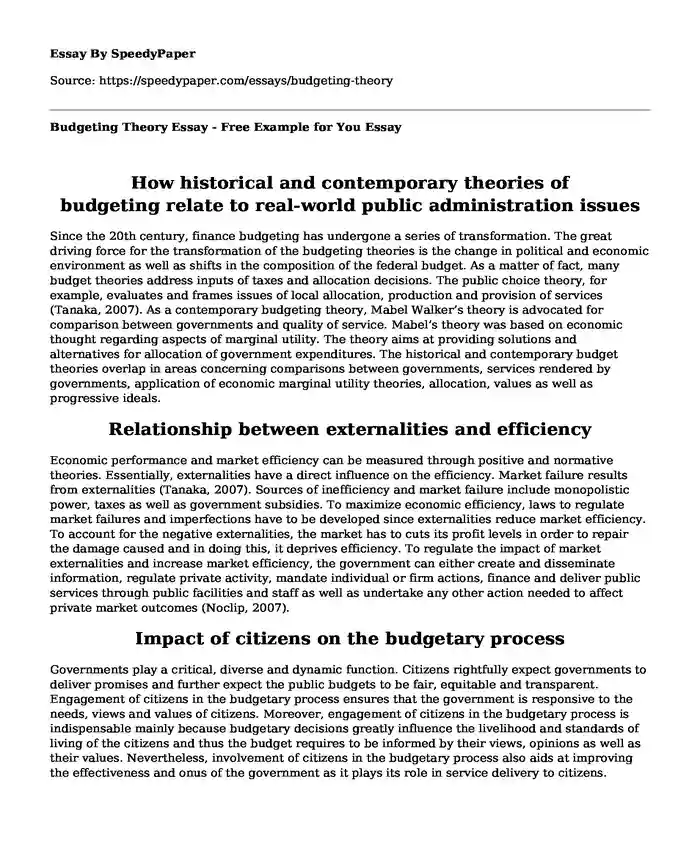
| Type of paper: | Essay |
| Categories: | Finance Government Budgeting |
| Pages: | 3 |
| Wordcount: | 644 words |
How historical and contemporary theories of budgeting relate to real-world public administration issues
Since the 20th century, finance budgeting has undergone a series of transformation. The great driving force for the transformation of the budgeting theories is the change in political and economic environment as well as shifts in the composition of the federal budget. As a matter of fact, many budget theories address inputs of taxes and allocation decisions. The public choice theory, for example, evaluates and frames issues of local allocation, production and provision of services (Tanaka, 2007). As a contemporary budgeting theory, Mabel Walker’s theory is advocated for comparison between governments and quality of service. Mabel’s theory was based on economic thought regarding aspects of marginal utility. The theory aims at providing solutions and alternatives for allocation of government expenditures. The historical and contemporary budget theories overlap in areas concerning comparisons between governments, services rendered by governments, application of economic marginal utility theories, allocation, values as well as progressive ideals.
Relationship between externalities and efficiency
Economic performance and market efficiency can be measured through positive and normative theories. Essentially, externalities have a direct influence on the efficiency. Market failure results from externalities (Tanaka, 2007). Sources of inefficiency and market failure include monopolistic power, taxes as well as government subsidies. To maximize economic efficiency, laws to regulate market failures and imperfections have to be developed since externalities reduce market efficiency. To account for the negative externalities, the market has to cuts its profit levels in order to repair the damage caused and in doing this, it deprives efficiency. To regulate the impact of market externalities and increase market efficiency, the government can either create and disseminate information, regulate private activity, mandate individual or firm actions, finance and deliver public services through public facilities and staff as well as undertake any other action needed to affect private market outcomes (Noclip, 2007).
Impact of citizens on the budgetary process
Governments play a critical, diverse and dynamic function. Citizens rightfully expect governments to deliver promises and further expect the public budgets to be fair, equitable and transparent. Engagement of citizens in the budgetary process ensures that the government is responsive to the needs, views and values of citizens. Moreover, engagement of citizens in the budgetary process is indispensable mainly because budgetary decisions greatly influence the livelihood and standards of living of the citizens and thus the budget requires to be informed by their views, opinions as well as their values. Nevertheless, involvement of citizens in the budgetary process also aids at improving the effectiveness and onus of the government as it plays its role in service delivery to citizens.
How individual needs determine Government’s expenditure.
Public finance defines the codependency between government and the people. The main aim of the public spending is to create jobs and thus, the role played by the government represents a dichotomy of providing goods and services as well as regulating private activity (Hyman, 2014). The role played by the government is crucial especially in the redistributing of income, reducing waste and increasing society’s health and life longevity. Some goods and services such as defense, roads, and bridges, merit goods such as hospitals, schools, welfare payments and education are too sensitive to be left in the hands of private sector. Thus, they need to be provided by the government. Individuals with property rights also influence government spending and economic growth. The need to redistribute income and achieve more equity also defines the manner in which the government spends its money.
Reference
Hyman, D. N. (2014).Public finance: A contemporary application of theory to policy (11th ed.). Stamford, CT: Cengage Learning.
Noclip, (2007). Economic Basis for Government Roles Front of U. S. Capitol Building MBA 6841, Public Budgeting 2.
Tanaka, S. (2007). Engaging the public in national budgeting: A non-governmental perspective. OECD Journal on Budgeting, 7(2), 139.
Cite this page
Budgeting Theory Essay - Free Example for You. (2017, Oct 06). Retrieved from https://speedypaper.com/essays/budgeting-theory
Request Removal
If you are the original author of this essay and no longer wish to have it published on the SpeedyPaper website, please click below to request its removal:
- Stress Management Essay Example
- Essay Example: Domestic Violence Case Study
- Linguistics Essay Example: Language and Variation
- The Invention of Wings by Sue Monk - A Literary Essay Sample
- Free Essay on Elements of Success According to Malcolm Gladwell: Timing vs. Time
- Essay Sample on Manual Repositioning Strategies
- Paper Example. Speaking Anxieties
Popular categories




